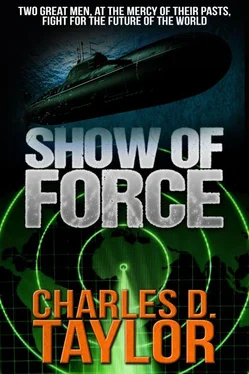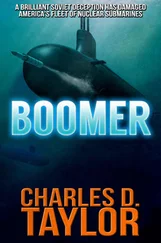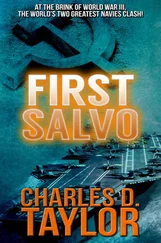"When you said he was an old friend, I didn't realize you'd actually met Admiral Kupinsky before, sir."
"Met? Hell, yes. I'll say I have, both formally and informally." He shut his eyes for a moment, stroking his nose with a thumb and forefinger. He remained quiet for a moment. He finally looked up at Dailey again, a saddened reflection in his eyes. "Yes, I certainly do know him. He's a very fine man." He stood up, finishing the iced tea as he stepped back from the table. "Come on, Bill, it's time."
"You're sure these Backfires are going to fire at us, aren't you, sir?"
"I don't know why not. They're controlled from the Kremlin, not from Kupinsky's group. Those ships coming toward us are a show of force, just like we are. Their orders come from Moscow, but the decision at a given instant to use weapons will be from the force commander. But these planes are probably in direct voice contact with Gorenko's staff right now."
"Use of weapons would be a direct provocation to war."
"It would be any time, but less so out here, Bill. There are no land masses to be concerned with, no civilians to worry about, no one's territory invaded. We're just two military forces up to no good as far as the people in Washington or Moscow are concerned. It's our job to be here and take our chances. Right?" He continued without waking for an answer. "The Chairman's speech makes it quite clear that the United States has already engaged in an act of war, and therefore stronger methods than usual are justified to warn us off. Now the U.N. or just about any other country is going to figure it serves both Russia or the U.S. right if we start shooting at each other's military forces as a warning. But, no one expects war. It's just that some bully drew a line across a point on the playground and said, 'Don't anyone cross it or I'll beat you up.' So now we've crossed it, and I think they probably want to make us go back to the other side. They've already announced that certain actions may be justifiable. And, after all, remember they say they're defending the Third World nations out here. What more do they need?" He nodded toward flag plot.
The Russian AS-7 cruise missile, launched from a Backfire bomber, has a range of almost five hundred miles. Its advantage is simply that it can be launched at a surface target, preferably a carrier, beyond the range of most of the carrier's flight umbrella. Then, it becomes the job of the protective surface screen around the carrier to stop the missile. The Backfire may then turn for its land base, avoiding the opposition's fighters completely.
On this particular day, as Admiral Charles and his staff operations officer entered plot, the Russian bombers had just released their missiles. But they didn't have the opportunity to return to their base immediately. The Navy Tomcat fighter is a bit faster, by about two hundred miles per hour. Since the Russian planes were bigger and heavier and could not change course until their missiles were released, the fighters were literally upon them at a distance of two hundred miles. And when the Backfires had completed their mission, they didn't simply turn around. At their speed of approximately two thousand miles per hour, they made a very long turn. By that time, the Tomcat's radar had locked on to their targets and their own Phoenix missiles had been released.
None of the planes ever saw each other beyond the display on their radar screens. However, four of the six Backfires were brought down by the American missiles. The other two were able to evade and managed to escape, since the Tomcats did not have the fuel to continue pursuit.
All of this was noted in the flag plot on Nimitz and relayed immediately to a computer outside Washington. In the meantime, the Admiral's anti-air-warfare officer was busy in front of his console, giving orders to people connected to his speaker and occasionally pushing buttons. There were twelve cruise missiles speeding toward them.
"Admiral, we have a solution. We've assigned Virginia and her division for the forward air defense. Each ship is radiating carrier characteristics. Impact time…" he looked at a dial on his console, "… fourteen minutes."
"Very well. Let me know when they're locked on and ready to bring them down." David Charles had a great deal of faith in the Aegis system. It had been designed specificially to counter such a threat, and its Standard missile had a range of three hundred fifty miles, if they ever had the opportunity to fire when a Russian missile was that far away. He felt that the combination of the antimissile system and the electronic equipment, which confused the attacking radar system into thinking that all ships were carriers, would protect Nimitz sufficiently.
He turned to Bill Dailey. "There's no longer any doubt about their intentions, Bill, and we're going to retaliate. I want a squadron of A-7's with some Tomcat protection out after Kupinsky." And, in answer to a question that never left Dailey's open mouth, "Nope. Conventional armament for now for the leaders. Drop two behind about four or five minutes with nuclear warheads. We won't use them until we explode one of those cruise missiles and see what it's carrying. And send orders out to the two submarines closest to Lenin. I want them to harrass the hell out of that screen around Lenin, but stay the hell away. Their long-range antisubmarine weapons aren't that good, so there's no reason to get up close to test their new ones. Have them pick out one of those Kresta- or Kara-class cruisers if they can."
He turned back to his status board to hear a report. "Fighter launch from Lenin now within radar range. Twelve aircraft. No identification yet."
"That makes sense," David remarked to no one in particular. "Land-based Backfires from Africa and those short range Riga fighters from the other direction. They've got to find out what we've got too, before they start anything really big."
Frank Welles's voice came from the speaker to his left. "Admiral, I've got some aircraft on deck if you want me to send them up to coordinate the antimissile firing."
"Negative, Frank. I believe" — he looked up at one of his staff who was giving him a thumbs-up sign—"the Aegis system has taken over now. Just a second." He called over to the officer controlling the Aegis computer and received a nod. "Right, the computer has control now. And we've already fired. In a moment they ought to be close enough to lock on. We don't really have any time anyway, Frank, with that strike I'm sending to the east after their surface ships." He turned off the speaker switch, and his eyes returned to the screen in the front of plot where the Russian cruise missiles were being tracked. Virginia and her division were now monitoring their tracking equipment to ensure their missiles were locked on to the incoming ones. While the electronic equipment took over, men were activating the automatic machinery that would reload the launchers for the next firing. Secondary computers had already picked up the track of the attacking missiles and were feeding information into the close-in Phalanx system, the secondary defense should the Standard missiles fail to complete their mission.
"Four minutes," replied the AAW officer at his air defense console.
"Rigas closing from the east, sir. They apparently had no contact with our own launch."
"Very well," David replied. "Is there any submarine movement near us?"
"They've been active, sir," Bill Dailey answered. "But nothing to make me think anything's being coordinated."
"They're always independent. Send a couple of those frigates out to fool with them. We're not ready for that sort of game yet." His eyes returned to the screen displaying the Russian and American missiles closing in on each other.
Читать дальше












